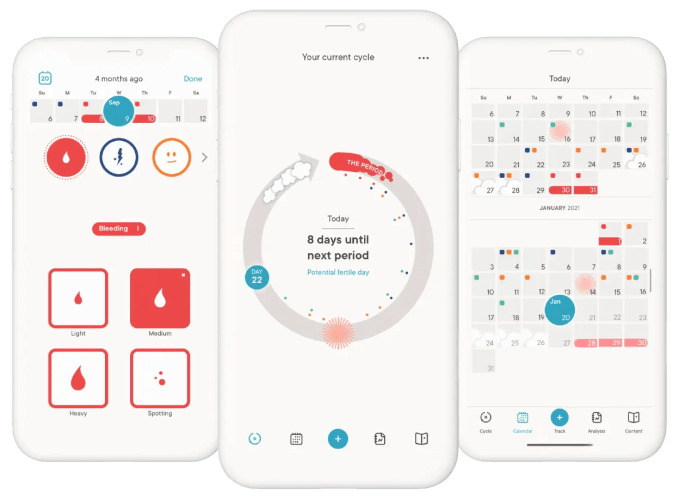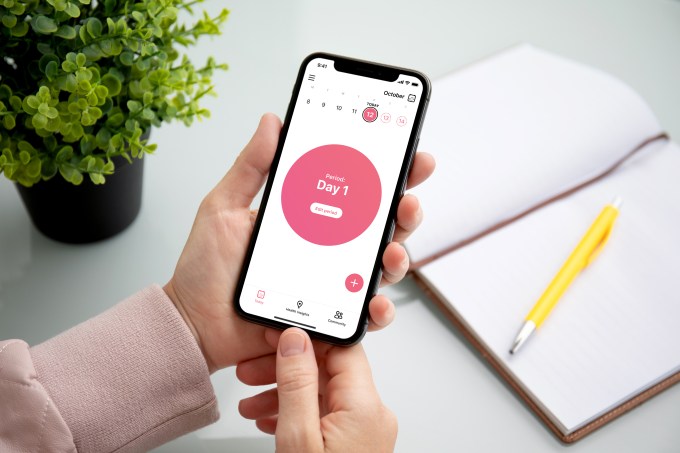Consumers swap period tracking apps in search of increased privacy following Roe v. Wade ruling
Consumers are ditching their current period tracking apps in favor of what they perceive to be safer options in the wake of the Supreme Court’s Roe v. Wade decision that allows individual U.S. states to criminalize abortion. The app switching trend is impacting all manner of period tracking apps, including leading app Flo, which owns a 47% share of the period tracking app market in the U.S., according to data provided by Apptopia. The app may have both lost customers to rival apps while gaining new users from others over the weekend. Other apps are seeing similar trends.
The patterns of app switching indicate consumers are seeking out increased privacy, as many of those gaining from this trend are companies that have made public statements in support of strengthened data security and privacy practices. But it’s also clear that consumers don’t necessarily have a good understanding of which apps to trust given that the current beneficiary of this increased switching activity is a potentially problematic app called Stardust, which had yet to implement its new privacy protections at the time it was making promises to users.
As a result of its claims, Stardust saw its daily average downloads increase by as much as 6,000% over the past weekend, Apptopia said. The relative newcomer to the period tracking market drew attention by promoting itself as a small, women-led team who wanted to provide users with a more secure app. Those claims resonated with consumers, driving the app to No. 1 on the App Store on Saturday. But in terms of data security, being a small team is not necessarily an advantage. TechCrunch found various data privacy issues with the version of the app that users downloaded over the weekend, including its sharing of users’ phone numbers with a third party.
Despite these issues, app intelligence firm Sensor Tower said the app gained 82% of its total 400,000+ lifetime installs this past Saturday through Sunday.
Another top app, Clue, also benefitted from consumers seeking alternatives. Apptopia found Clue’s app saw a 2,200% increase in installs over the weekend after it made comments in the press that it won’t divulge sensitive information to states. Sensor Tower reported Clue had also reached its highest-ever rank on Saturday as the No. 15 overall free app on the App Store. It has since dropped to No. 93, which suggests the rank change had been the result of a surge of app switchers.

Several other apps saw increased installs on Saturday, June 25, too. Compared with the month of June, Glow’s ovulation app saw its average daily downloads jump 21% and its period tracker Eve saw average daily installs increase 83%, Apptopia said. An app called Natural Cycles – Birth Control saw average daily installs rise 53%; another called Period Tracker by GP Apps saw a 17% increase; and the app Femometer saw a 10% increase. Single-digit increases were also seen in apps including My Calendar – Period Tracker and Ovia Fertility & Cycle Tracker, the firm found.
Finally, leading app Flo moved up slightly on Saturday as a result of the app switching activity. Flo jumped from No. 197 on June 23 before the ruling to No. 187 on Saturday, June 25, Sensor Tower said. It’s now moved up more to No. 180 as of the time of writing. It’s worth noting that Flo’s average daily installs had been on the decline for several months, Apptopia had reported — in part, likely due to news of its 2021 settlement with the FTC over earlier privacy violations. That indicates consumers have been thinking about data privacy well before the Supreme Court ruling.

Image Credits: Flo (opens in a new window)
After the court’s decision on Friday, Flo issued a statement in hopes of stemming the tide of app switchers or those inclined to delete their accounts. It said:
“Flo will always stand up for the health of women, and will do everything in its power to protect the data and privacy of our users. To add to our security measures already in place (read more about that here), we will soon be launching a new feature called “Anonymous Mode” – an option that allows users to remove their personal identity from their Flo account. Lastly, Flo will never require a user to log an abortion or offer details that they feel should be kept private, and users can delete their data at any time. We firmly believe that our users deserve complete control over their data and we are here to support our users every step of the way.”
Clue also issued a lengthy response to Roe v. Wade on its website, which stressed its adherence to strict European data privacy laws and use of encryption. GP Apps, the maker of Period Tracker, published a strong statement, as well, though its privacy policy indicates that it would comply with legal requests and subpoenas. (However, it noted that consumers can opt to use its account without an online account, which would then only store data locally on the user’s device.) Other companies have published statements on their websites and social media accounts, as well.
But without a deeper analysis of each company’s privacy policy and more sophisticated testing of each app’s privacy and security protections, it’s hard to recommend that the use of any third-party period tracking app is a 100% safe decision at this time, regardless of their statements and claims.
One possible solution to this problem is to simply use Apple’s Health app alone for the time being, where end-to-end encryption of users’ Health records is available through iCloud. Unfortunately, data on Apple’s first-party apps isn’t available so we’ll never know how many consumers made this choice.
from TechCrunch https://ift.tt/DOy6hSX
Comments
Post a Comment